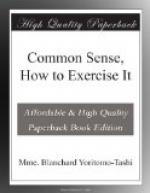We refer to that tendency which has been adorned or rather branded successively with the names of hypochondria, pessimism, and lastly neurasthenia, an appellation which comprises all kinds of nervous diseases, the characteristic of which is incurable melancholy.
“There are people,” he says, “who are afflicted with a special color-blindness.
“Everything they look at assumes immediately to their eyes the most somber hues.
“They see in a flower only the germ of dry-rot; the most ideal beauty appears to them only like the negligible covering of some hideous skeleton.
“However, they hang on to this life which they do not cease to calumniate, and people of common sense are rarely found who will try to reason with them from a common-sense standpoint:
“’Since life is so insupportable to you, why do you impose upon yourself the obligation to struggle with it?
“’Only insane people try to prolong their sojourn in a place where they suffer martyrdom.’
“It is true that when, perchance, this argument is placed before them, they do not fail to reply by invoking the shame of desertion.
“’Well, is not then the interest of the struggle to which we are subjected a sufficient attraction to keep us at our post?’”
And, always enamored with the doctrine, which we are now assiduously maintaining, he concludes:
“Common sense is, at times, the unfolding of a magnificent force which incites us to attune our environment to actualities.
“One must not, however, fall into excess and draw a huge sword to pierce the clouds, which obscure the sun.
“If struggle is praiseworthy when we have to face a real enemy, it becomes worthy of scorn and laughter if we attack a puerile or imaginary adversary.
“But the number of people incapable of appreciating the true color of things is not limited to those who enshroud them in black.
“There are others, on the contrary, who obstinately insist upon surrounding them with a halo of sunlight only existing in their imagination.
“For such deluded people, obstacles seen from a distance take on the most attractive appearance; they would be readily disposed to enjoy them and only consent to allow them a certain importance if they absolutely obstruct the way.
“But until the moment when impossibility confronts them, do they deny its existence or underrate its importance by attributing a favorable influence to it.
“This propensity to see all in the ideal would be enviable if it did not wound common sense, which revenges itself by refusing to these improvident people the help of the reasoning power necessary to sustain them in the crisis of discouragement which brings about irresistibly the establishment of error.
“These unbalanced people rarely experience success, for they are unable, as long as their blindness lasts, to mark out a line of serious conduct for themselves.




